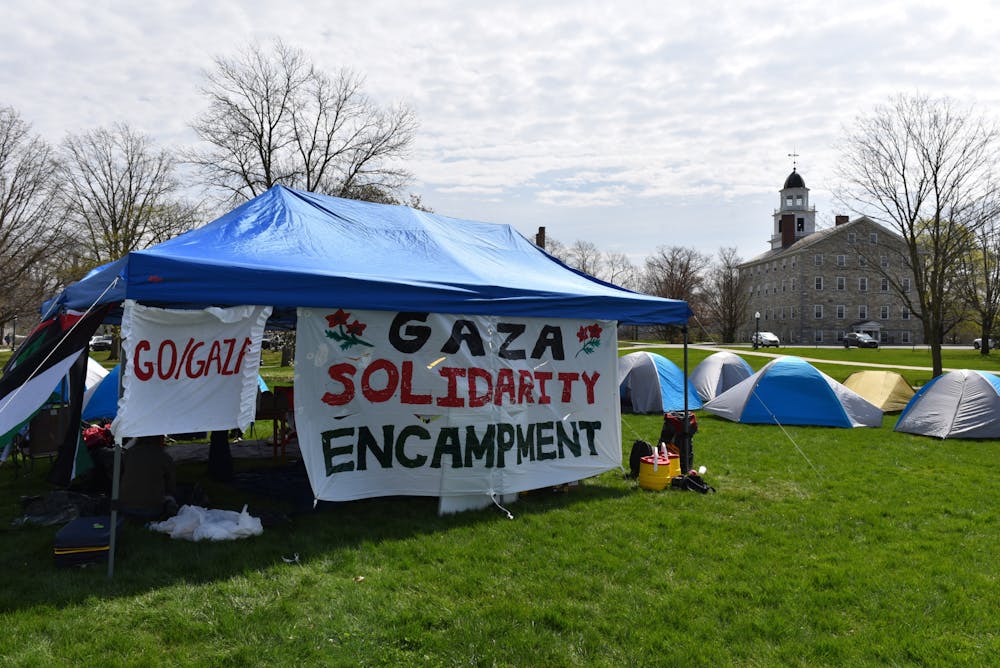Two weeks before Middlebury College opened its doors for the 2024–25 academic year, students received a lengthy email from lead administrators clarifying their policy on open expression. The message, sent on Aug. 29, began with an acknowledgement of the school’’s interest in its connection to ongoing international affairs, specifically naming the war in Israel and Gaza. Quickly, though, the authors narrowed the focus of the message to concentrate on how students are permitted or not permitted to express their beliefs on campus. While continued dialogue between Middlebury’s administration and student body is critical as we attempt to better understand Middlebury’s role in the global community, the message places undue constraints on student protests, and includes veiled critiques of last year’s demonstrations that call into question the extent to which the school truly seeks to protect students’ right to express their beliefs.
Towards the end of the administration’s message are six newly clarified components of the Open Expression policy. To start, the college reserves the right to determine the “time, place and manner” of protests, in the interest of “sustainably” apportioning its resources. Essentially, Middlebury reserves the right to prevent or significantly alter this type of student expression if it is deemed “unsustainable.” This subjective term offers administrators significant freedom in denying or approving protests on a case-by-case basis. It also significantly reduces students’ freedom to express their beliefs in the “manner” they choose. In using the term “sustainable” rather than “safe,” the college reserves the right to limit student advocacy even when there is no threat to the safety of anyone on campus, which is very troubling.
Even more explicitly, the message prohibits any demonstration that causes “substantial disruption to academic activities and essential business operations.” This indicates the school’s commitment to protect the freedom of expression for only those protesters who do not threaten the college’s operational status quo. Obviously, the college prefers to decide for itself when its policies should change. But, I believe that a school committed to supporting “sustainable” free expression and critical thinking in and outside of the classroom should not be threatened by, and would do well to actively encourage, impassioned calls for reform from non-violent student demonstrators.
Last spring, Middlebury students — myself included — organized by Student Justice for Palestine (SJP) held demonstrations to raise awareness about the disproportionate violence of the Israeli government toward the Palestinian people and to push Middlebury to reexamine some of its pedagogical and financial practices in light of the war. The encampment, similar to others across U.S. college campuses, occupied a central and highly visible space on a quad lawn.
“They want protests to be controlled by the terms they set," SJP President Merih Etgü ’26 wrote to me in an email regarding the leadership team’s recent communication. He went on to write that if Middlebury were fully dedicated to protecting free speech, they would not restrict things such as where posters can be displayed or the number of people allowed to table outside dining halls.
The leadership team lauded student activists for conducting “demonstrations, protests, vigils, and teach-ins…with care and respect,” but were quick to assert that in the future, activism “must be sustainable.” They claimed the deployment of additional resources to support student expression last spring caused intense “emotional, psychological” and “physical” fatigue among staff and faculty. Through this generalization, the leadership team denied its employees, many of whom actually “volunteered” to work with students, the agency to present their own experience. Supporting open expression should not place undue pressure on staff and faculty, and it remains primarily Middlebury’s responsibility to consistently provide employees with satisfactory working conditions..
Finally, in the interest of recognizing Middlebury’s acknowledged connection to global conflict, we must remember that there is nothing less sustainable than war and terror. In May of last year, the Student Government Association (SGA) released a referendum to assess the student body’s opinion on four points concerning the alteration of Middlebury investment practices. Over 70% of students on campus last spring voted in the referendum. Notably, 90.5% of respondents indicated their support of full financial transparency on current and future Middlebury investments, 82.9% supported divestment from arms manufacturing companies, and 82.7% supported divestment from all forms of war profiteering. In light of a significant portion of the student body expressing an interest in reforming Middlebury’s investment practices, perhaps the next message from administration could provide an update on divestment negotiations.
By assuming near-total control over the location, manner, and scope of student protests, the school dramatically limits students’ ability to press our institution toward reforming those practices we find unfair, unjust, or simply ineffective. In the spirit of free and open expression, as well as education, I encourage all members of this Middlebury community to continue thinking critically not only within explicitly academic settings, but to consider our institution and the world outside of it with an equal amount of skepticism.




